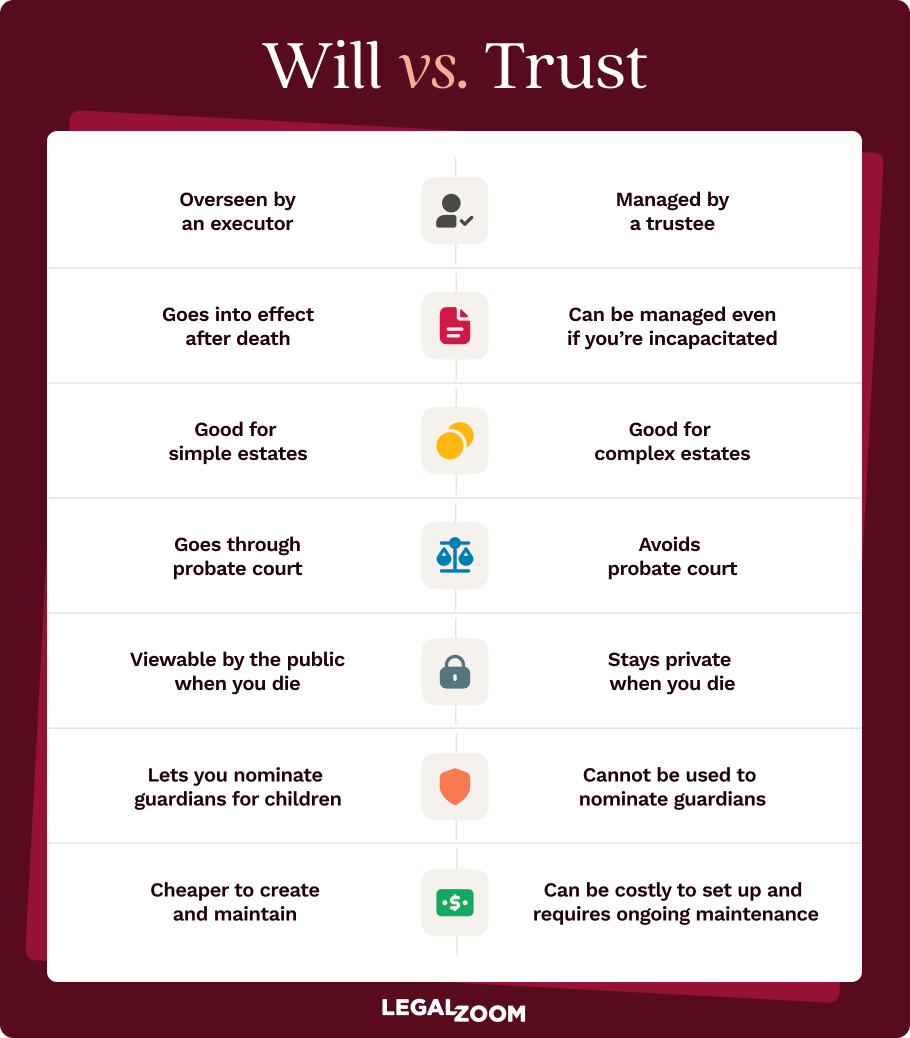When it comes time to build an estate plan, most people find themselves torn between two options: a will or one of the various types of trusts. And, while both a will and a trust can help protect your assets and loved ones in the event of your death, there are important differences between the two documents that can heavily impact the estate planning process.

What is a will?
In general terms, a will is a binding legal document that details how a person's possessions and responsibilities should be handled after they die. More specifically, a will allows individuals to designate beneficiaries to receive property, choose who should act as guardians for their minor children, and even outline what kind of funeral they'd like.
The 8 most common types of wills
Most people will only ever need a basic will. That said, there are others which may warrant consideration in certain circumstances, such as:
- Simple wills. Typically reserved for individuals with less complicated financial situations, a simple will covers who assets should be distributed to and, if necessary, how children should be taken care of.
- Testamentary trust wills. A sort of hybrid will and trust, this legal document outlines a trust to be created after a person's death. Rather than distributing assets immediately, a testamentary trust will manages assets for beneficiaries until a predetermined date.
- Joint wills. Often preferred by married couples, a joint will is a single document, signed by two people, stating that the entirety of an estate goes to the other person when one signing party dies. After the second signing party dies, the estate is distributed like a normal will, depending on the terms it lays out.
- Living wills. Sometimes called an "advance directive," a living will is a special type of will that doesn't specify inheritances or how assets should be distributed. Instead, a living will outlines a person's wishes regarding medical treatment, end-of-life care, and what should be done if they are incapacitated by an illness or accident.
- Pour-over wills. Typically used to augment a living trust, a pour-over will automatically add any assets not included in a trust to that trust once its creator dies.
- Holographic wills. Less advanced than its name might imply, a holographic will is a will written and signed in the creator's own handwriting. Though not valid in every state, this kind of will, when accepted, removes the need for witness signatures.
- Oral wills. Technically called a nuncupative will, an oral will is spoken rather than written and is typically reserved for situations such as an unexpected illness or accident. Though valid in many states, an oral will must meet strict requirements in order to be considered binding, such as being heard by a certain number of credible witnesses.
- Mirror wills. Similar in many ways to a joint will, mirror wills are two wills, the provisions of each "mirroring" the other. Most commonly used by married couples, a mirror will leaves most or all of one person's assets to their spouse in the event of their death. If beneficiaries are named, they're typically identical between both mirror wills.
Our step-by-step online tool helps you make key decisions with confidence, at your pace.

What is a trust?
A trust is a legal arrangement where one party (the trustee) holds and manages assets on behalf of another party, (the beneficiary). Although they tend to be more complex and specialized than wills, trusts can be used to accomplish more specific goals, such as reducing tax liability or protecting certain assets.
The 8 most common types of trusts
While there are dozens of types of trusts, these are the eight you're most likely to encounter when building an estate plan:
- Revocable living trusts. Perhaps the most popular type of trust overall, a revocable living trust gives the creator broad control over its contents and how to distribute assets after their death. Unlike irrevocable trusts, this type of trust can be modified (or revoked entirely) at any time before the creator's death.
- Irrevocable trusts. Once they've been established and signed, irrevocable trusts can't be modified or terminated without the express permission of their beneficiaries. By design, irrevocable trusts offer impressive tax benefits and protect assets from creditors.
- Testamentary trusts. Often created to supplement a will, testamentary trusts only take effect after their creator dies and allow you to delay asset distribution.
- Charitable trusts. Rather than distributing assets to normal beneficiaries, charitable trusts are set up to support one or more charities and often come with tax benefits for their creator.
- Special needs trusts. These allow a grantor to support a beneficiary with special needs or disabilities while still allowing them to claim Medicaid or Social Security benefits.
- Spendthrift trusts. If one or more of your beneficiaries has creditors, a spendthrift trust can protect the assets you give them from being seized or given away.
- Life insurance trusts. An irrevocable trust that owns a life insurance policy, intended to exclude the proceeds from the insured’s estate for tax purposes.
- Bypass trusts. Sometimes called "credit shelter trusts," bypass trusts are often used by married couples to help reduce the estate taxes that they would normally have to pay on one partner's assets when they die.

Key differences between wills and trusts
There are countless differences between wills and trusts, and deciding between the two depends on your unique circumstances. Each comes with its own distinct advantages and disadvantages depending on your estate planning needs, but these are some of the most important differences:
Probate
As anyone who has gone through the process can tell you, probate court can be expensive, exhausting, and frustrating, often testing the patience of everyone involved. Still, it's a key part of executing a will and transferring assets to the proper beneficiaries, so make sure that the terms of your will are exceptionally clear when writing it.
If, instead, you'd like to avoid probate court entirely, a trust might be a better choice. Trusts, while providing less flexibility and room for negotiation than a will, offer a much faster, more streamlined way to transfer assets to your beneficiaries.
Privacy
By design, wills enter into the public record once they've been executed. This is to ensure that any beneficiary overlooked during the probate process can come forward and claim their inheritance.
Trusts, on the other hand, almost always remain private—both before and after they've been executed. For individuals who prefer a more discrete, private way to transfer assets, a trust may be better than a will.
Asset distribution
Except for a few specific types, wills mean that beneficiaries will only receive assets after the will's creator dies. Even then, executing a will involves probate, which can take months or years to reach a conclusion. This means that, while a will often means that assets are distributed exactly the way a grantor wants, the process may take much longer than is ideal.
Conversely, trusts are more flexible, specialized documents that allow their writers to specify exact dates or circumstances that trigger asset distribution. Not only does this simplify and accelerate inheritances, but it also avoids probate court entirely.
Flexibility
With the exception of living wills, most wills are fixed and inflexible by design, allowing for a concrete, guaranteed succession of wealth. While wills can be modified via codicils, the process is more complicated and stricter than it would be with a trust.
Trusts, on the other hand, are built with flexibility in mind. Because they allow a grantor greater freedom to adjust terms or revoke rights, they may be much better for individuals who expect changes to their finances or relationships.
Cost and complexity
On the whole, wills are simpler and less expensive than trusts to create and maintain—even with similarly complex estates. In general, the flat fee for a simple will is about $300. A standard living trust, on the other hand, will run between $2,500 and $4,000.
That said, the ability to include specific provisions in a trust (and modify them, if necessary) means that trusts may be the better option where uncertainty is involved.
Planning for incapacitation
Unless you opt for a living will, most wills don't have the power to outline what should happen in the event that you are incapacitated. For people with illnesses or advanced age, this can greatly complicate things should worse come to worst.
Trusts and living wills, on the other hand, allow for baked-in provisions with explicit instructions for what to do in such a situation.
Taxes
Generally speaking, wills offer little to no protection against taxes. Many trusts, however, can be written in such a way that significantly reduces capital gains tax liability for beneficiaries. For individuals with complicated financial situations, this makes a well-built trust a powerful estate planning tool.

Trust vs will: how to decide in five simple steps
While it may seem complicated, deciding whether to manage your estate with a trust or a will comes down to five basic steps:
1. Review estate assets
Before you do anything else, sit down and write out a complete inventory of your assets and finances. This list should include real estate, stocks and other investments, retirement accounts, personal possessions (jewelry, for instance), and anything else of significant value.
2. Research state laws
Federal law aside, local laws about estate planning can vary greatly from state to state. In order to save you (and your beneficiaries) time and confusion, make sure that you fully understand the laws of the state in which you live. This includes information about the state's probate process, how estate tax is handled, and whether there are any special provisions about trusts and wills.
3. Calculate tax liability
Now that you have an inventory of your assets and an understanding of state laws, you should calculate your estate's total estimated tax liability. Remember to include estate taxes, inheritance taxes, and any tax breaks you might gain from using different types of estate planning tools.
For more complex estates, it's best to hire an estate planning lawyer or tax professional to help you through this step.
4. Think about family
Difficult though it may be, take an honest look at your family dynamic and the relationships you have. Will your beneficiaries have relatively equal needs, or will some need more than others? Do you foresee conflict during the asset distribution process? If conflict or complications are likely, setting up a trust might be the better choice. If you expect things to go smoothly, however, a will might get the job done.
5. Consult the experts
If, after you've made your way through the previous five steps, you're still wondering which option is best for you, consider speaking with an estate planning attorney. These professionals have dedicated their entire careers to navigating the nuances between different estate planning options, and they can help unpack your situation in a way that gives you the clarity you need.
Even better, an experienced estate planning attorney can help you draft the document you ultimately choose, saving you time and money searching once you've made your choice.

Secure your legacy
After a life spent building your estate and cultivating assets, the last thing you want is for all that effort (and money) to go where it doesn't belong. Regardless of whether you ultimately choose a will or a trust, think about hiring a legal professional to help write and revise your estate plan of choice.
Not only does this simplify the process, but it also gives you the peace of mind of knowing that your estate and your beneficiaries will be well looked after when the time comes.
FAQs
What kind of assets can’t be put in a trust?
While the vast majority of asset types can be put into a trust, including real estate, investments, and heirlooms, there are a few exceptions:
- Retirement accounts. Although it's possible to name a beneficiary for your IRA, 401(k), or other retirement accounts, you aren't allowed to transfer these into a trust without suffering tax penalties. One potential workaround is to name the trust as beneficiary of your retirement account, though this is a complicated situation.
- Foreign assets. Though this mostly applies to assets owned in countries that don't recognize trusts, it's best to tread carefully when trying to include a foreign asset in your trust.
- Life and medical insurance. Unless you specifically use an irrevocable life insurance version, your life and medical insurance savings accounts cannot be owned by a trust.
How much does the average will cost?
For a traditional will written and reviewed by an estate planning lawyer, the average will can cost between $300 and $1,000, all things considered. A basic simple will, on the other hand, may cost around $100.
For people with more complex finances, many beneficiaries, or extensive estates, however, this number may be much higher. Still, any extra fees you pay on the front end may pay for themselves many times over when it comes time to distribute assets and pay taxes.
Is a will or a trust better for taxes?
Without specific, niche provisions, most wills provide little to no protection against taxation. During probate, any assets distributed to your beneficiaries will likely be subject to state and federal estate tax.
Trusts, on the other hand (and especially irrevocable trusts), are often designed with taxes in mind. Written and used correctly, trusts may help your beneficiaries minimize estate taxes, avoid the probate process, and side-step inheritance taxes.
Can I have a will and a trust at the same time?
In short, yes. Having both a will and a trust is more common than you might think. While this option can be more complicated than having one or the other, it also allows you greater control over how your assets are distributed and gives greater flexibility for minimizing tax liabilities.

